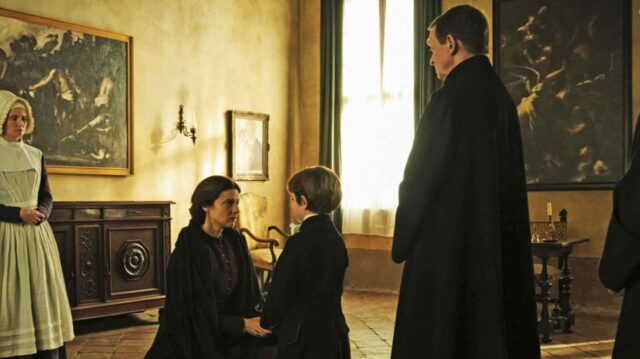One of the last surviving red-hot ’60s New Wavers, Marco Bellocchio has had a sine wave of a career, now in its sixth decade — fresh out of the gate with Fists in the Pockets (1965) and China Is Near (1967), hitting something of a controversy-seeking nadir in the ’80s with Devil in the Flesh (1986) and The Witches’ Sabbath (1988), and then rising to a stirring, wise, and eloquent valedictorian peak in the new century with My Mother’s Smile (2002), The Wedding Director (2006), and Vincere (2009). Since then, he’s been busily spinning his wheels as codgers often do, lunching in Italian history and literature as though it were all a seven-fishes Christmas feast, with films that have always been sumptuously staged and shot but that sometimes end up glutted, aimless, and in need of a rethink. His new film, Kidnapped (co-written with Susanna Nicchiarelli, and helpfully, if redundantly, subtitled for us The Abduction of Edgardo Mortara), is legacy Bellocchio, in that it’s as compelling and vivid in its disinterment of history as it is ultimately didactic and dramatically muddled.
The matter of Edgardo Mortara, from the mid-1800s, is a Wikipedia bonanza that’s certainly more of a cultural benchmark at home than elsewhere, and Bellocchio does the history straight. It’s one of those instances when a single act of injustice, amplified around the world by a booming newspaper industry, tipped an empire over — in this case, the Papal States (five big chunks, including Rome and the Vatican, of what would become a unified Italy when the decades of the Risorgimento were finally complete), which were ruled by the Pope for over a thousand years. In what seems like an almost whimsical act of administrative hubris, a minor Church Inquisitor, having heard that a Jewish boy had been amateurishly baptized by a servant girl when he was a sickly baby, orders the now six-year-old boy, Mortara (Enea Sala), seized from his large and affluent family in Bologna and brought to Rome, where he was to live (with dozens of other kids snatched under the same or similar rationales) under the direct supervision of Pope Pius IX (Paolo Pierobon).
As the terrified and baffled youngster is ordered to shed his Jewishness and become a good Catholic, his distraught father and mother (Fausto Russo Alesi and Barbara Ronchi) begin to raise hell, and the Mortara case, which we see via montages and animated editorial caricatures, becomes a global cause célèbre that righteously impugns the Church’s unassailable authoritarianism. The stress of the situation, perhaps helplessly, reduces each character and earnest performance to two dimensions, with the exception of Pierobon’s Pope, who’s given shadings and nuances, and who is all the same the one figure in the mix we’d like to see drop dead.
Interestingly, the Mortara case was epically famous during the Risorgimento years, and yet, suspiciously, it fell out of the history of 19th-century Italy almost entirely (while never having been forgotten by Jewish historians everywhere), until being revived in the 1990s. It is, in any case, a big platterful of sociohistorical comestibles for any film to encompass, and Bellocchio meets the challenge by hewing close to the child — a stunned tot fussed over by creepy Christian functionaries in vast cathedral chambers — and by emphasizing the minutiae of the culture clash. It’s not hard to cast the Mortara family, and therefore, Jewishness, as warm and loving and sensible when the counterpoint scenario for this unlucky cherub is all the gargoylish, power-mad, irrational tyranny that the post-medieval Catholic Church had to offer. Bellocchio doesn’t hyperbolize — his images are too beautiful, too consistently crepuscular — but his point is pounded into the ground. Still, often enough, the touch has nuance — when one sickly housemate dies after everyone has been ordered to pray for him, Edgardo asks a friend, What was the point? During another, dreamy interval, Edgardo slips from his bed, scales a life-size crucifix, pulls the spikes from the hands and feet, and then watches as Jesus climbs down and walks away.
The history, as history is often wont to do, finally leaves Bellocchio without a focus, as the offending Inquisitor is arrested and tried, the revolutionary forces are closing in on Rome, and Edgardo grows up into a priest, perfectly happy where he is. Kidnapped is a noble effort at hog-tying historical flow into a straight line, but there is so much vital context that must be merely suggested: Italy’s modernization into a single nationhood (a key protest looks like it involved just a few dozen participants), the coalescence of a powerful worldwide consciousness around the Jewish diaspora, the growing disengagement with the Vatican’s authority that came with industrialization and literacy, etc.
Even the Church’s motivations for its institutional and nonsensically rationalized abductions are left unexpressed — surely there’s a political purpose somewhere in the insidious bureaucracy? (Maybe it’s merely to broaden the base by force, mission-style, as the kids’ parents were encouraged to convert in order to get their child back, a strategy that would in theory replace the heathens over the long haul.) As a result, Bellocchio’s physically lovely film ends up feeling somewhat one-note — it’s an anti-clerical, anti-Papist piece of work, and that’s all.
“Kidnapped: The Abduction of Edgardo Mortara,” Opened May 31 at Opera Plaza Cinema 4.




